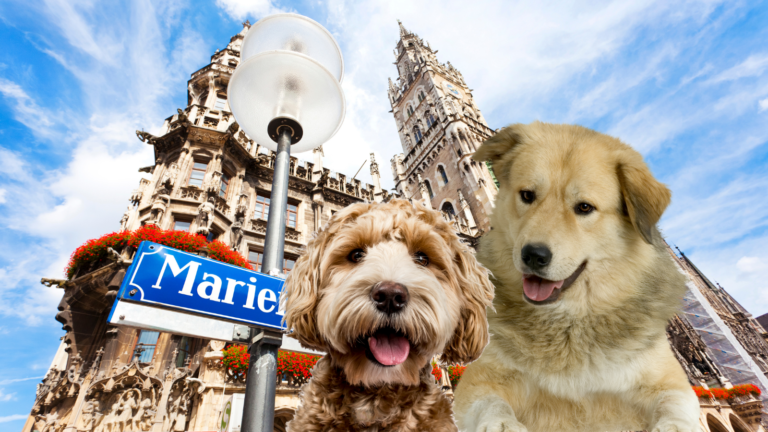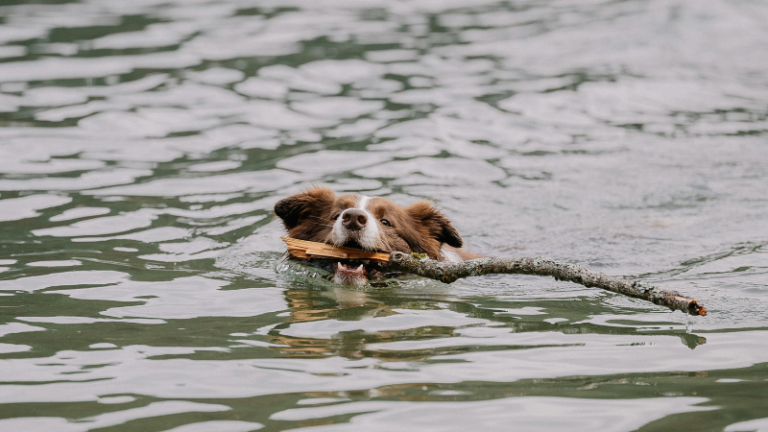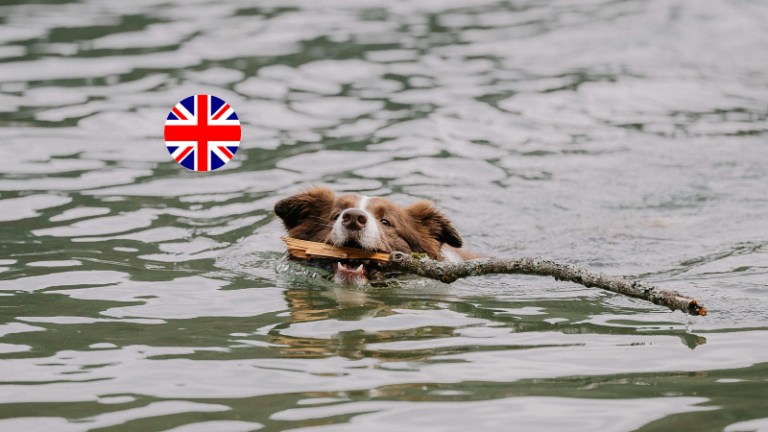
Dog Tax in Hamburg
In Hamburg, a dog tax is imposed on dogs that are at least three months old. The annual tax is €90, while dogs classified as dangerous under the Dog Law are subject to a higher tax of €600 per year. Payment is due in two installments of €45 each, on February 15th and August 15th.
The Tax Office for Traffic Taxes and Property is responsible for assessing the dog tax. Under certain conditions, such as receiving welfare benefits or having a severe disability of at least 50%, a tax exemption can be granted upon request. Additionally, there are reductions for dogs adopted from animal shelters, though not for dangerous dogs. The classification of a dog as dangerous is determined by the Dog Register.
As of January 1, 2021, tax tags ("dog tags") are no longer issued.
Additional forms and information about the dog tax can be found on the City of Hamburg's website.

Warning About Poisoned Bait
In Hamburg and the surrounding areas, there are frequent incidents involving dangerous poisoned bait being deliberately placed. These malicious traps pose a serious threat to the lives of our dogs and require utmost vigilance. When walking your dog, be sure to closely monitor what they pick up or eat.
To stay informed, it’s a good idea to join WhatsApp groups that share location-specific information for dog owners. The next time you're out walking your dog, ask other dog owners if they know of any such groups. Often, you can get this information quickly through a small talk.
Additionally, we came across a website that publishes current reports about poisoned bait. This site seems to provide timely updates, so we highly recommend it:
Es gibt Hundetrainer in Hamburg, die sich auf das Thema Giftköder spezialisiert haben. Besonders in der frühen Hundeerziehung ist es sinnvoll, frühzeitig mit solchem Training zu beginnen, damit dein Hund nicht alles, was am Boden liegt, als interessant betrachtet. Wenn du nach einer Hundeschule oder einem Trainer suchst, der dir dabei hilft, deinen Hund vor der Aufnahme von Giftködern zu schützen, dann ist „Anti-Giftköder-Training“ der richtige Suchbegriff für dich.
The signs of poisoning in a dog can vary and depend on the type of poison that was ingested. It is important to act quickly if you suspect your dog has eaten poisoned bait. Here are some common symptoms to watch out for:
- Vomiting and Diarrhea: Common and early signs that may sometimes be mixed with blood.
- Increased Salivation: Some poisons can lead to excessive drooling.
- Tremors or Seizures: Neurotoxins can cause muscle twitching, tremors, or even severe seizures.
- Lethargy or Weakness: A poisoned dog may appear unusually weak or have difficulty standing up.
- Breathing Problems: Difficulty breathing, rapid breathing, or even shortness of breath are serious symptoms.
- Behavioral Changes: Changes in behavior, such as aggression, anxiety, or confusion, may also indicate poisoning.
- Loss of Coordination: Stumbling or difficulty walking can signal neurological issues.
- Excessive Drinking or Urination: Some poisons can affect kidney function, leading to changes in drinking and urination habits.
- Yellowing of the Skin or Eyes (Jaundice): A sign of liver involvement.
Bleeding: Unusual bleeding or blood in urine/stool can occur, especially with rat poisons.
If you notice any of these symptoms in your dog, it is crucial to seek immediate help from a veterinarian or emergency clinic. Early detection and treatment are vital for your dog’s survival. Provide the vet with as much information as possible about the potential ingestion of poison and observed symptoms to facilitate quick and targeted treatment.
You can reach the Hamburg Veterinary Emergency Service at the Hamburg phone number 040-43 43 79. This service is organized by the Hamburg Veterinary Chamber and ensures that your pet receives care in urgent situations outside of regular office hours. The emergency service is available at the following times:
Monday to Friday nights: From 8:00 PM to 8:00 AM the following day
- Saturdays, Sundays, and public holidays: 24 hours, from 8:00 AM to 8:00 AM the next day
Save this number to be able to act quickly and effectively in an emergency.

The Public Order Office in Hamburg and Dogs
In Hamburg, there is a general leash requirement for dogs. Your dog must be kept on a leash unless you have obtained an exemption. For dangerous dogs, there is an absolute muzzle and leash requirement.
You can obtain an exemption from the general leash requirement if you can demonstrate that your dog is well-behaved and under control in everyday situations, so that it poses no danger or nuisance to others. After receiving this exemption, you are allowed to let your dog run freely in areas where there are no special leash requirements or restrictions on bringing dogs.
The leash requirement applies especially in shopping centers, pedestrian zones, at events, in forests or nature reserves, and near schools and playgrounds. Additionally, female dogs in heat and dogs that have already shown problematic behavior must be kept on a short leash.
In parks and recreational areas, there are specific rules: Dogs are not allowed on playgrounds, lawns, or flower gardens. On pathways, they must be kept on a short leash unless there are special exceptions for obedience-tested dogs. In the districts, there are designated dog run areas where you can let your dog run freely after obtaining an exemption from the leash requirement.
If you would like to apply for an exemption from the leash requirement, you can:
Take an obedience test with a recognized expert,
Provide proof that you have passed an equivalent test, or
Submit a veterinary certificate if your dog is unable to take the test due to health reasons.
The fees for the exemption vary: €27 for an exemption granted by a recognized expert or €42 for an exemption granted by the Office of Consumer Protection, Trade, and Environment.
Also, be aware of the special leash requirements and restrictions on bringing dogs in certain areas, such as shopping centers or nature reserves, and make sure to check the local regulations beforehand.

Dogs on Public Transportation
Your dog can travel for free on the HVV as long as they are kept on a leash. However, there is an exception: Dangerous dogs (see the list of dangerous dogs) are not allowed to travel for free. Additionally, dogs that could potentially injure people must wear a muzzle. It is also important that dogs are not allowed on the seats.

Dog Off-Leash Areas in Hamburg
Hamburg offers numerous off-leash areas where your dog can run and play freely. These specially designated spaces allow your dog to move without a leash, which is beneficial for both their health and social behavior. In these off-leash areas, dogs can romp around to their heart's content and make new friends.
The city has distributed these zones across all districts, ensuring that every dog owner can find a suitable area nearby. You can find a complete list of all off-leash areas in Hamburg, including specific locations and rules, by
download here.Take advantage of these opportunities to give your dog the necessary exercise and variety while also adhering to city regulations.

Visiting Cafés in Hamburg with Your Dog
If you've spent time in other major European cities outside of Hamburg, you'll appreciate how dog-friendly our city is. It's rare to find a place here where your beloved four-legged friend isn't welcome.
Visiting Cafés with Your Dog:
In Hamburg, you can generally expect that bringing your dog to a café is not a problem in most cases. Many cafés even welcome dogs with a water bowl at the entrance.
Tips for Visiting a Café with Your Dog:
- Choose a café with enough space for your dog to move around comfortably.
- Make sure your dog is kept on a leash and doesn't disturb other guests.
- Bring some treats to reward your dog.
- Ensure your dog has plenty of water.

FAQ for Dog Owners in Hamburg
Hamburg offers several lovely spots where your dog can go swimming. Here are some popular dog-friendly swimming areas:
Elbstrand Övelgönne: A very popular spot for dog owners. Dogs can run along the beach and jump into the water. However, it is not officially designated as a dog beach, so be considerate of other beachgoers.
Elbstrand Falkensteiner Ufer: Another section of the Elbe where dogs are welcome to swim. As with Övelgönne, it's important to be mindful of others since the beach is frequently visited by many people.
Hochzeitswald in Wilhelmsburg: This recreational area has a small lake where dogs are allowed to swim.
Stadtparksee: The city park offers a dedicated dog beach at the Stadtparksee where dogs can swim and play freely.
Hundeauslaufgebiet Höltigbaum: This large off-leash area has several ponds where dogs are allowed to swim. It’s an ideal spot for long walks and water fun.
For a complete list of dog off-leash areas, including those with water access, you can download the overview here.
Make sure your dog stays in the permitted areas and that you follow the local rules to ensure a harmonious experience for everyone. Enjoy splashing around!
The Hamburg Dog Register is a central database where all dogs kept in Hamburg must be registered. The registration requirement applies to all dog owners and serves several purposes:
Safety and Control: The Hamburg Dog Register ensures that all dogs are properly recorded. This helps in identifying and monitoring dangerous dogs.
Traceability: In the event of a lost or found dog, the register allows for quick identification of the owner, enabling the dog to be returned promptly.
Health Monitoring: The registration also helps in overseeing compliance with vaccinations and other health measures.
Tax Obligation: The data in the dog register is used to levy and manage the dog tax. Every registered dog must also be recorded for tax purposes.
In Hamburg, certain dog breeds are classified as so-called "listed dogs," which are considered potentially dangerous. These dogs are subject to specific legal regulations to ensure public safety. The following breeds and their crossbreeds are classified as listed dogs in Hamburg:
- Pitbull Terrier
- American Staffordshire Terrier
- Staffordshire Bull Terrier
- Bull terrier
If you do not promptly remove your dog's waste from public paths or green spaces, you are committing a regulatory offense. The responsible public order offices can impose a fine of €35 for this violation. In certain cases or for repeated offenses, a higher penalty may be imposed. It is important to be aware of your responsibilities as a dog owner and to contribute to cleanliness and hygiene in public spaces.
In Hamburg, the dog license is not mandatory for all dog owners. However, there are certain situations where proof of expertise through a dog license or an equivalent test is required:
Dangerous Dogs: If you own a dog that has been classified as dangerous or belongs to the listed breeds (Pitbull Terrier, American Staffordshire Terrier, Staffordshire Bullterrier, and Bull Terrier), you must prove your expertise. This is typically done through a specific test or by obtaining a dog license.
Exemption from Leash Requirement: To obtain an exemption from the general leash requirement, you must demonstrate that you can safely handle your dog in everyday situations. This can be done by passing an obedience test or presenting a dog license.
Problematic Behavior: If your dog displays aggressive behavior or repeatedly causes issues, the relevant authority may require a competency test. In such cases, the dog license can help prove your ability to manage your dog effectively.
Voluntary Dog License
Even if you don't fall into one of the above categories, it can still be beneficial to voluntarily obtain a dog license. This demonstrates that you are a responsible dog owner and can handle your dog well. Many dog schools in Hamburg offer relevant courses and exams.
Overall, the dog license is not mandatory for all dog owners in Hamburg, but it is required in certain situations and is always a good way to demonstrate your expertise and responsibility as a dog owner.









